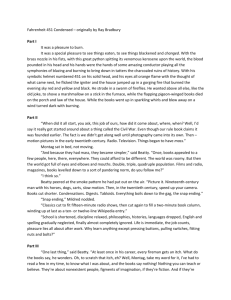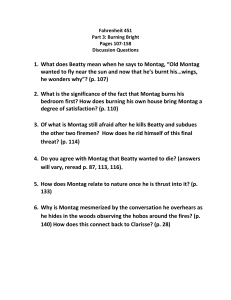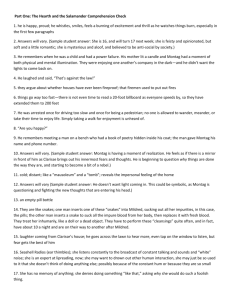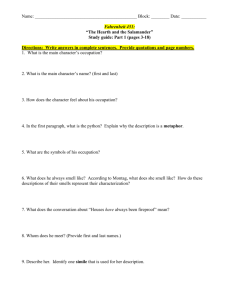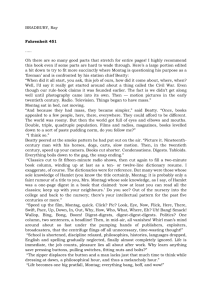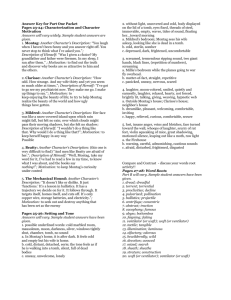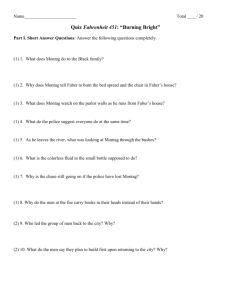FAHRENHEIT 451 BEATTY.doc
advertisement
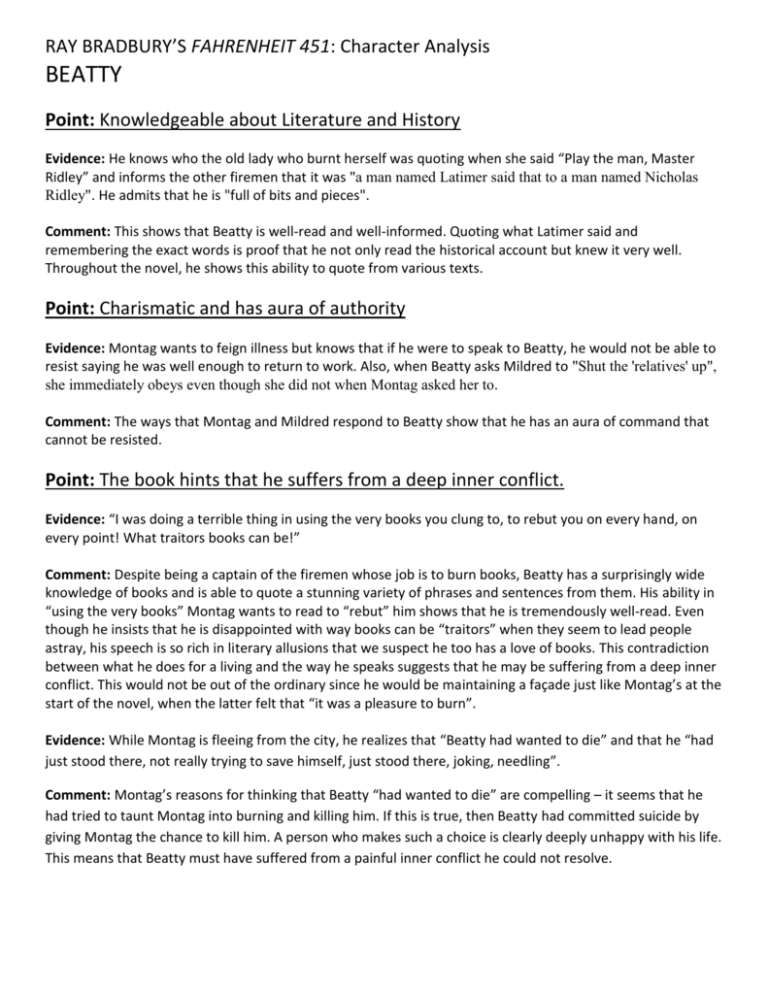
RAY BRADBURY’S FAHRENHEIT 451: Character Analysis BEATTY Point: Knowledgeable about Literature and History Evidence: He knows who the old lady who burnt herself was quoting when she said “Play the man, Master Ridley” and informs the other firemen that it was "a man named Latimer said that to a man named Nicholas Ridley". He admits that he is "full of bits and pieces". Comment: This shows that Beatty is well-read and well-informed. Quoting what Latimer said and remembering the exact words is proof that he not only read the historical account but knew it very well. Throughout the novel, he shows this ability to quote from various texts. Point: Charismatic and has aura of authority Evidence: Montag wants to feign illness but knows that if he were to speak to Beatty, he would not be able to resist saying he was well enough to return to work. Also, when Beatty asks Mildred to "Shut the 'relatives' up", she immediately obeys even though she did not when Montag asked her to. Comment: The ways that Montag and Mildred respond to Beatty show that he has an aura of command that cannot be resisted. Point: The book hints that he suffers from a deep inner conflict. Evidence: “I was doing a terrible thing in using the very books you clung to, to rebut you on every hand, on every point! What traitors books can be!” Comment: Despite being a captain of the firemen whose job is to burn books, Beatty has a surprisingly wide knowledge of books and is able to quote a stunning variety of phrases and sentences from them. His ability in “using the very books” Montag wants to read to “rebut” him shows that he is tremendously well-read. Even though he insists that he is disappointed with way books can be “traitors” when they seem to lead people astray, his speech is so rich in literary allusions that we suspect he too has a love of books. This contradiction between what he does for a living and the way he speaks suggests that he may be suffering from a deep inner conflict. This would not be out of the ordinary since he would be maintaining a façade just like Montag’s at the start of the novel, when the latter felt that “it was a pleasure to burn”. Evidence: While Montag is fleeing from the city, he realizes that “Beatty had wanted to die” and that he “had just stood there, not really trying to save himself, just stood there, joking, needling”. Comment: Montag’s reasons for thinking that Beatty “had wanted to die” are compelling – it seems that he had tried to taunt Montag into burning and killing him. If this is true, then Beatty had committed suicide by giving Montag the chance to kill him. A person who makes such a choice is clearly deeply unhappy with his life. This means that Beatty must have suffered from a painful inner conflict he could not resolve. Beatty’s Relationship with Montag Point: Dominates Montag emotionally Evidence #1: While Montag plays cards with Beatty, we learn that “In Beatty's sight, Montag felt the guilt of his hands.” Comment: Even without Beatty saying anything, Montag feels “guilt”. He is afraid that Beatty will find out about the books he has stolen and feels that fear intensely in Beatty’s presence. The fact that Beatty’s mere presence inspires such fear shows that he dominates Montag emotionally. Instead of feeling justified in his own actions, Montag feels only fear and guilt when Beatty is around. Evidence #2: Montag wants Mildred to help him call Beatty because he is “afraid”. He compares himself to “a child feigning illness, afraid to call because after a moment's discussion, the conversation would run so: ‘Yes, Captain, I feel better already. I'll be in at ten o'clock tonight.’” Comment: Montag is unable to lie to Beatty because he cannot resist Beatty’s aura of authority. A “child feigning illness” would not be able to keep up the pretence when questioned by an adult because the adult has superior intelligence and authority. In the same way, Montag’s confidence crumbles in Beatty’s presence. Point: Confuses and disorientates Montag Evidence: Montag's head whirled sickeningly. He felt beaten unmercifully on brow, eyes, nose, lips, chin, on shoulders, on upflailing arms. He wanted to yell, "No! shut up, you're confusing things, stop it!" Comment: Conversations with Beatty typically leave Montag confused and disorientated. After Beatty describes the dream in which he holds a debate with Montag about the value of books, Montag feels as if he has been beaten and bruised. The words “beaten unmercifully on brow, eyes, nose, lips, chin, on shoulders, on upflailing arms” describe a situation where one is hit on several places at the same time and cannot do anything to defend oneself. The words “upflailing arms” tell us that the person is waving his or her arms wildly, but clearly this is not enough to stop the blows raining down on him or her. A person in such a predicament would obviously feel confused and helpless, and this is just how Montag feels as Beatty attacks him with quotation after quotation. Because of Beatty’s mental assault, Montag cannot maintain any mental focus. He cannot remain sure of the value of books.

